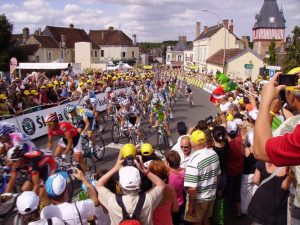5 French Terms to Know for the Tour de France
By Sarah-Claire Jordan
 We are now in the last weeks of the Tour de France, the world-famous annual bicycle race that started this year in the Netherlands on July 4th. There are 22 teams participating this year, with 32 different countries represented. The race has many stages, including mountainous terrain, flat terrain, and everything in between. The last day of the race this year is July 26th, and it will end in Paris as is the tradition. Though the route does include a few neighboring countries, the majority of the race happens throughout France. Because of its French origins, many of the terms that are specific to the Tour de France are French words. Here are five that you should know if you are interested at all in the most popular cycling event in the world:
We are now in the last weeks of the Tour de France, the world-famous annual bicycle race that started this year in the Netherlands on July 4th. There are 22 teams participating this year, with 32 different countries represented. The race has many stages, including mountainous terrain, flat terrain, and everything in between. The last day of the race this year is July 26th, and it will end in Paris as is the tradition. Though the route does include a few neighboring countries, the majority of the race happens throughout France. Because of its French origins, many of the terms that are specific to the Tour de France are French words. Here are five that you should know if you are interested at all in the most popular cycling event in the world:
1. Lanterne Rouge
Literally translated, “Red Lantern” refers to the cyclist that comes in dead last at the end of the race, meaning they have finished the race in the most amount of time. The term comes from the red lantern that used to hang off the caboose of a train, letting the conductors know that none of the carriages had become disconnected. It may seem odd, but this is actually a distinction that many cyclists strive for. If you are among the cyclists in the very back, it’s better to be the very last one than the second to last.
2. Peloton
“Peloton”, or “little ball,” is a term that is actually used by all cyclists, not just the ones that compete in the Tour de France. It is the name for the main group of riders in a long-distance cycling race. The cyclists in a peloton travel very close together, as a way of reducing drag from wind, thus making it easier for each of them to cycle faster. These kinds of group tactics are common and practically essential for competing cyclists.
3. Soigneur
French for “caretaker”, these are the members of a Tour de France team who take care of the cyclists but who do not themselves cycle. They make sure each team member has enough water and food and they give massages and other services that a member might need. The soigneurs also make sure the cyclists get to the hotels on time to get enough sleep each night.
4. Chapeau
“Chapeu”, which roughly translates to “tip of the hat” in English, is a term used to congratulate another cyclist on their achievements. It is a way to show that you appreciate the other cyclists and what they are doing. This is a great way to keep up the morale of all cyclists, as the Tour de France is certainly not an easy race.
5. Musette
One important thing the soigneurs are responsible for is making sure each rider gets their “musette”, or lunchbox at each feed zone of the race. The bag is lightweight and designed to be easy to grab quickly. It is filled with cakes, sandwiches, energy bars, and other food items as well as bottled water. All of the items in the bag must be easy to eat or drink while riding and must provide the rider with enough energy until the next feed zone.
For an overview of our translation expertise, visit our telephone interpreting service page
Category: Foreign Language








